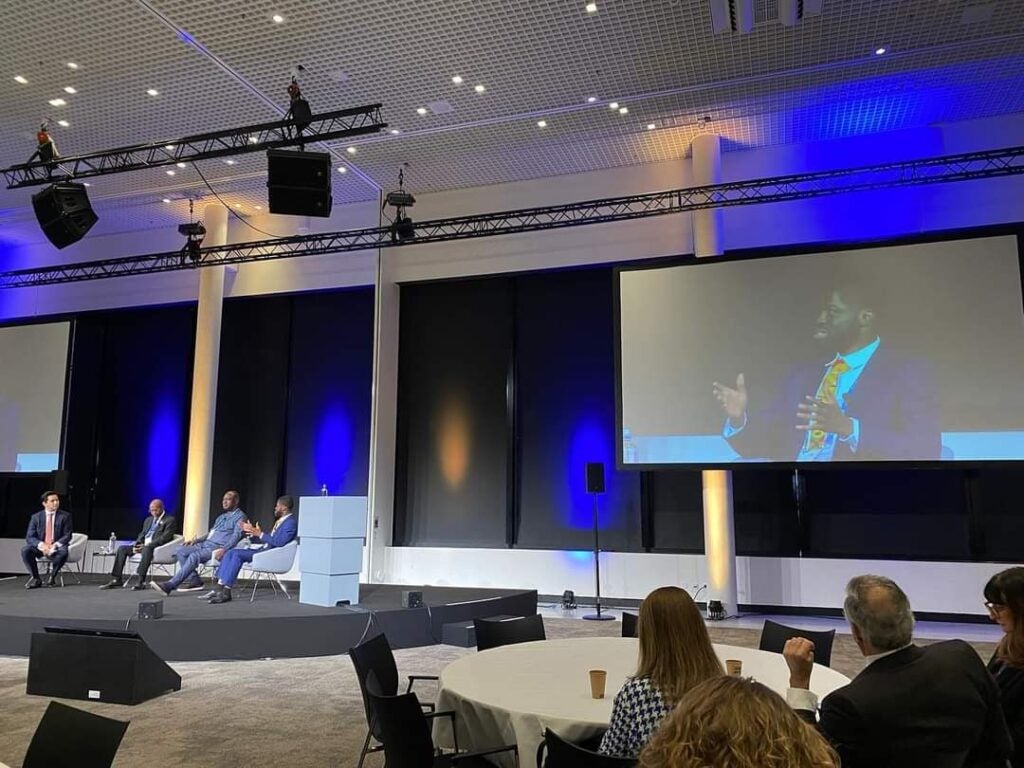
Empowering Africa: Exploring African Solutions at World Energy Congress
At the recent 26th World Energy Congress in Rotterdam, Ing. Justice Ohene-Akoto, a Kleinman Center grant recipient and Penn graduate student, delivered a powerful call to action for Africa's energy sector. This insight shares highlights from that speech.
Africa faces a stark reality: over 40% of the continent’s population lacks access to electricity. This lack of energy access not only hampers individual livelihoods but also translates into significant economic losses. Even in Ghana, with an energy access rate of about 87%, still lost approximately 6% of its GDP due to power outages in 2016. This startling statistic underscores the urgent need for strategic investments in the energy sector.
Central to harnessing Africa’s energy potential is its youth—mobilized through industrialization and job creation. Industrialization, fueled by a reliable energy sector, is key to unlocking economic opportunities and addressing societal challenges like migration. An “African solution” to Africa’s energy problems relies on homegrown strategies that leverage the continent’s unique strengths and resources.
To move energy policy forward, we must reframe energy discussions to highlight their economic and social impacts. Rather than focusing solely on energy access or power outages, we must shift toward discussing the tangible economic losses and the social ramifications of inadequate energy infrastructure. This reframing can galvanize policymakers and stakeholders toward implementing targeted solutions.

As the founder of the Africa Sustainable Energy Centre (ASEC), I am actively working to complement initiatives like the African Energy Bank, addressing the financial gaps in Africa’s energy sector. ASEC’s focus on collaboration, innovation, and knowledge transfer aligns with his vision of empowering local experts and innovators to drive sustainable energy solutions.
During the congress, discussions on closing the skills gap for energy transition readiness resonated strongly with my policy-focused approach. I urged for proactive knowledge transfer from seasoned industry players to the younger generation, emphasizing the need for continuous skill development to meet the demands of a rapidly evolving energy landscape.
Here are the pointed policy recommendations that emerged from my insights:
- Reframing Energy Discussions: Shift the conversation from energy access to highlighting economic losses and social impacts caused by inadequate energy infrastructure. This reframing can drive targeted policy interventions.
- Integration of Energy and Industrial Policies: Emphasize the critical role of a robust energy sector as the backbone of industrial growth. Reliable electricity supply is essential for unlocking economic potential, creating jobs, and addressing social challenges like migration.
- Support for Initiatives like ASEC: Encourage collaboration, innovation, and knowledge transfer through initiatives like the Africa Sustainable Energy Centre (ASEC). These platforms complement financial mechanisms and empower local expertise.
- Closing the Skills Gap: Prioritize continuous skill development and knowledge transfer to bridge the skills gap for energy transition readiness. Proactive measures are needed to equip the younger generation with the skills required for a rapidly evolving energy landscape.
The congress’s overarching theme, “Redesigning energy for people and planet,” provided a strategic backdrop for policy dialogues. My insights on framing energy policies to address economic losses and social impacts resonated with policymakers and industry leaders alike. This reframing can catalyze policy reforms that prioritize sustainable energy transitions and drive investments in critical infrastructure.
In celebrating 100 years of impactful engagement, the World Energy Congress organized by the World Energy Council which took place from the 22nd April to 25th April, underscored the imperative of policy-driven initiatives to address global energy challenges. My policy-focused contributions exemplified the congress’s emphasis on actionable solutions and pragmatic policy frameworks.
As I reflect on the congress’s outcomes, I’m reminded that the time for action is now. With strategic investments, innovative solutions, and collaborative efforts, Africa can unlock its energy potential and pave the way for a brighter, more sustainable future.
Ing. Justice Ohene-Akoto
MSE, School of Engineering and Applied SciencesIng. Justice Ohene-Akoto is a multiple award-winning Ghanaian Inventor and Professional Engineer. He is Founder of the Africa Sustainable Energy Center (ASEC) and a Senior Advisor at JP Partners & Associates. He’s currently pursuing an MSE in Electrical Engineering at the University of Pennsylvania.

